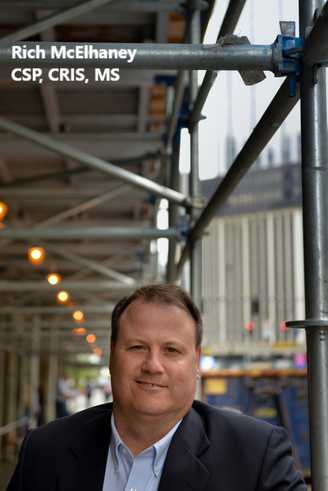
Editor's Note: Rich's Presentation is a "Must See" at all levels of an organization
Richard McElhaney CSP, CRIS, MS
Health & Safety Keynote Speaker
102 Honeytree Court
Venetia, PA 15367
Phone: 724-549-8781
Email: [email protected]
BIO:
Richard McElhaney has been in the Health and Safety Management field for over 26 years. He has provided safety consulting services for many companies on a global scale. Mr. McElhaney has presented and worked in Australia, Canada, China, Panama, and Africa.
Mr. McElhaney received his B.S. in Occupational Safety and Health Management from Slippery Rock University of Pennsylvania in 1992. He has also earned his M.S. in Safety Science from West Virginia University in 2011. His professional designations include, Certified Safety Professional (CSP) and Construction Risk Insurance Professional (CRIS).
With over 26 years of diverse safety experience, Mr. McElhaney’s expertise includes an extensive knowledge in oil & gas, heavy civil construction, general industry, and MSHA. Areas of concentration include cranes, fall protection, confined spaces, safety training, scaffolding, and global safety program development. He is also an authorized safety trainer for OSHA, MSHA, and PEC Safeland. Mr. McElhaney has been an active member in American Society of Safety Engineers since 1990.
Presentation Description:
“The Real Cost of Safety”:
You’re invited to a candid discussion with Mr. Richard McElhaney as he talks about the effects of traumatic injuries not only on the employee but on the family, coworkers, and the company.
Mr. McElhaney will also speak about six accident reduction techniques that had the greatest impact over his 26 years in the health and safety field.
He will reveal what the real costs are of being safe.
He will revisit the importance of the Job Safety Analysis (JSA) as a preplanning tool. “JSA’s have been around for many years, but they have become complacent on many projects globally.” Mr. McElhaney will review in detail an injury that occurred on one of his projects and how the use of JSA’s would have prevented the injury and how the JSA process turned things around.
Richard McElhaney CSP, CRIS, MS
Health & Safety Keynote Speaker
102 Honeytree Court
Venetia, PA 15367
Phone: 724-549-8781
Email: [email protected]
BIO:
Richard McElhaney has been in the Health and Safety Management field for over 26 years. He has provided safety consulting services for many companies on a global scale. Mr. McElhaney has presented and worked in Australia, Canada, China, Panama, and Africa.
Mr. McElhaney received his B.S. in Occupational Safety and Health Management from Slippery Rock University of Pennsylvania in 1992. He has also earned his M.S. in Safety Science from West Virginia University in 2011. His professional designations include, Certified Safety Professional (CSP) and Construction Risk Insurance Professional (CRIS).
With over 26 years of diverse safety experience, Mr. McElhaney’s expertise includes an extensive knowledge in oil & gas, heavy civil construction, general industry, and MSHA. Areas of concentration include cranes, fall protection, confined spaces, safety training, scaffolding, and global safety program development. He is also an authorized safety trainer for OSHA, MSHA, and PEC Safeland. Mr. McElhaney has been an active member in American Society of Safety Engineers since 1990.
Presentation Description:
“The Real Cost of Safety”:
You’re invited to a candid discussion with Mr. Richard McElhaney as he talks about the effects of traumatic injuries not only on the employee but on the family, coworkers, and the company.
Mr. McElhaney will also speak about six accident reduction techniques that had the greatest impact over his 26 years in the health and safety field.
He will reveal what the real costs are of being safe.
He will revisit the importance of the Job Safety Analysis (JSA) as a preplanning tool. “JSA’s have been around for many years, but they have become complacent on many projects globally.” Mr. McElhaney will review in detail an injury that occurred on one of his projects and how the use of JSA’s would have prevented the injury and how the JSA process turned things around.
